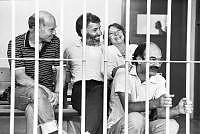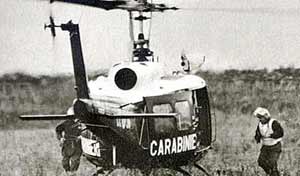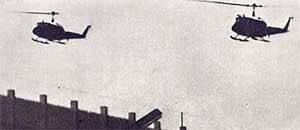"Lo statuto dei gabbiani, da Ormai è fatta! alle poesie, la vita e le opere del bandito gentile", collana banditi senza tempo, pagg. 320, Milieu edizioni, giugno 2012 >> acquista on line su www.ndanet.it
sabato 28 dicembre 2013
mercoledì 25 dicembre 2013
L'Attesa (a Camus) di Horst Fantazzini
L'ATTESA (a Camus)
Mi guardo intorno e vedo il vuoto,
chiamo e non mi risponde che l'eco.
Questa solitudine lacererebbe di meno se
non vi trovassi incrostati in ogni dove
risatine di scherno, tentennamenti di capo,
gesti e sguardi complici condannanti
il diverso, l'escluso, l'intruso.
No, non griderò,
non darò loro alibi
per giustificare l'assurda condotta.
Attenderò un'altro intruso, altri diversi,
tutti gli esclusi.
Quel giorno non renderemo loro
lo scherno e il disprezzo,
ma ci limiteremo a lasciarli estinguere
nel loro misero deserto intellettuale.
In solitudine, silenziosamente.
Senza eredi.
HORST FANTAZZINI - Carcere di Marsiglia, 1968
Mi guardo intorno e vedo il vuoto,
chiamo e non mi risponde che l'eco.
Questa solitudine lacererebbe di meno se
non vi trovassi incrostati in ogni dove
risatine di scherno, tentennamenti di capo,
gesti e sguardi complici condannanti
il diverso, l'escluso, l'intruso.
No, non griderò,
non darò loro alibi
per giustificare l'assurda condotta.
Attenderò un'altro intruso, altri diversi,
tutti gli esclusi.
Quel giorno non renderemo loro
lo scherno e il disprezzo,
ma ci limiteremo a lasciarli estinguere
nel loro misero deserto intellettuale.
In solitudine, silenziosamente.
Senza eredi.
HORST FANTAZZINI - Carcere di Marsiglia, 1968
lunedì 23 dicembre 2013
Documento scritto da Notarnicola,Terranova, Fantazzini, Battaglia e Ognibene dopo il tentativo di evasione dal Carcere di Favignana, 5 novembre 1976
Etichette:
1976,
Beppe Battaglia,
carcere,
Carmelo Terranova,
evasioni celebri,
Favignana,
Horst Fantazzini,
Roberto Ognibene,
Sante Notarnicola
giovedì 21 novembre 2013
Meglio libri che male accompagnati. Milieu a Scighera MILANO 29 novembre - 1 dicembre
Cosa c'è meglio di un libro?
In Scighera, con la collaborazione di Edizioni Elèuthera, si apre la prima edizione di una fiera per incontrare il meglio degli editori indipendenti, case editrici che si muovono fuori dalla logica dello stretto guadagno commerciale e scelgono i titoli da pubblicare rispettando quello in cui credono e che reputano bello e importante.
Si comincia venerdì sera 29 novembre con un concerto di DJ Malatesta e Drowning Dog, per proseguire sabato 30 novembre e domenica 1 dicembre (dalle 14.00 in poi) con l'esposizione delle case editrici insieme a presentazioni, readings e musica. E naturalmente i vini della Scighera e incursioni culinarie della Locanda dell'Assurdo.
Sabato 30 novembre e domenica 1 dicembre sarà possibile acquistare tessera arci 2013 al prezzo di costo (5,00 €) e quella 2014 con un buono di 2,00€ per l'acquisto di un libro in Fiera.
PROGRAMMA
Etichette:
2013,
Edizioni Milieu,
Horst Fantazzini,
L'ultimo colpo di Horst Fantazzini,
LIbri,
Lo statuto dei Gabbiani,
Milano,
Milieu edizioni,
Scighera
Ubicazione:
Milano, Italia
martedì 12 novembre 2013
sabato 26 ottobre 2013
martedì 8 ottobre 2013
19 ottobre * Lo Statuto dei Gabbiani a Fossano
Etichette:
23 luglio 1973,
Biblioteca Civica di Fossano,
Fossano,
Giorgio Bertani,
Horst Fantazzini,
Lo statuto dei Gabbiani,
Ormai è fatta!,
Patrizia Diamante
mercoledì 2 ottobre 2013
Lo statuto dei gabbiani alla Sesta Vetrina dell'editoria anarchica e libertaria a Firenze
Domenica 6 ottobre nella saletta a piano terra 12,10-12,50 PATRIZIA “PRALINA” DIAMANTE: - Presentazione del libro: “Lo statuto dei gabbiani, da Ormai è fatta! alle poesie, vita e opere del bandito gentile” di Horst Fantazzini
presso OBIHALL ex Teatro Tenda Lungarno Aldo Moro angolo via Fabrizio De André
presso OBIHALL ex Teatro Tenda Lungarno Aldo Moro angolo via Fabrizio De André
mercoledì 4 settembre 2013
Ho due foto nel portafoglio, una è di Gaetano Bresci, l'altra è di Horst
venerdì 23 agosto 2013
martedì 23 luglio 2013
lunedì 22 luglio 2013
sabato 20 luglio 2013
Ricordo di Carlo
Il 20 luglio 2001 ero a Bologna nella nostra casa di via del Roncrio, stavamo ascoltando la radio, io a fare ginnastica e Horst in piedi a fumarsi una sigaretta. Quando arriva "in diretta" da una voce concitata e quasi spezzata, una voce maschile ricordo, e molto agitata perché non riusciva a capire cosa realmente stesse accadendo e quale nome avesse il compagno steso a terra attorniato da altre persone... quando arriva come un pugno nello stomaco la notizia dell'assassinio di un ragazzo a Genova durante la grande manifestazione. Horst disse a voce molto alta: "Lo avevano programmato, l'hanno fatto, bastardi!!!!!!
Pralina
Pralina
venerdì 28 giugno 2013
Horst Bio * dal Blog "Buggstories - Tales from Uprising" * Traduzione e adattamento di Marco Presz
Iscriviti a:
Post (Atom)



















